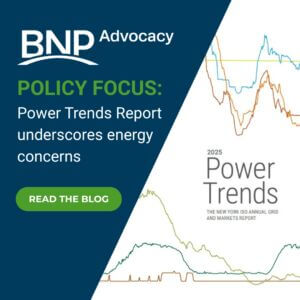Policy focus: Power Trends Report underscores energy concerns
The Partnership
June 12, 2025
Blog Categories
 This week, the New York Independent System Operator released its annual Power Trends report, which details the state of New York’s electric grid. The report’s findings are concerning and underscore the need for a more sensible approach to climate and energy policy. This week, the New York Independent System Operator released its annual Power Trends report, which details the state of New York’s electric grid. The report’s findings are concerning and underscore the need for a more sensible approach to climate and energy policy.
Why Do Employers Care? Ensuring adequate energy supply is an economic development imperative. To attract, retain, and grow businesses in our region, employers must have the confidence that the grid can supply their businesses’ energy demands. If not, they will look elsewhere. “Shrinking reliability margins” is not a phrase that inspires confidence in investors, site selectors, or Buffalonians in a blizzard. Demand Up, Supply Down Businesses are becoming increasingly energy intensive. Accordingly, there is considerably more demand on the grid than in prior years. The report notes: “requests from data centers, high-performance computing projects and chip manufacturing [have] grown dramatically in recent years. 19 projects are currently requesting to connect to the grid for a total incremental load of 3,000 MW. The timing of these projects will have major impacts on system risk, highlighting the need for large investment in energy infrastructure.” Moreover, as state climate policy aims to replace gas-powered equipment with electric (vehicles, appliances, heating systems, etc.), the demand for electricity will increase – and not just marginally. According to the report, if the state pursues full electrification, grid demands could double over the next twenty years. The need for power is higher than ever and will only grow. Meeting that demand will require a Herculean effort to expand the grid. However, New York is going in the wrong direction. According to the report, since 2019, New York has added 2,274 MW of generating capacity, but deactivated 4,315 MW – a net decrease of 2,041 MW. The decrease is because the state shuttered nuclear and natural gas electric generating facilities during this timeframe. Less Reliable Grid
Power producers and energy utilities are working overtime to address these challenges by adding new generating capacity, expanding transmission infrastructure, and promoting efficiency upgrades. However, sound public policymaking is needed to ensure energy remains affordable and reliable. How Should Policymakers Respond? The BNP’s energy advocacy is crafted with these grid realities in mind. Consistent with our Advocacy Agenda, lawmakers should:
Questions? Email Director of Government Affairs Josh Veronica at JVeronica@thepartnership.org. |
Related Posts
U.S. Chamber of Commerce awards Buffalo Niagara Partnership with 5-Star Accreditation
The U.S. Chamber of Commerce’s prestigious 5-Star Accreditation designation is in recognition of the Buffalo Niagara Partnership’s sound policies, effective organizational procedures and significant positive impact on the community it serves.
Buffalo Niagara Partnership hosts first Leading Women event
The Buffalo Niagara Partnership’s first Leading Women event was an afternoon led by an inspiring host committee of women shaping the future of Western New York.
Election night wrap-up: Who won and what it means for Buffalo Niagara
Buffalo Niagara voters made their voices heard on Nov. 4 in a series of key local races. Based on unofficial vote tallies, here’s a look at who won and what’s next for our region’s leadership, courtesy of Buffalo Niagara Partnership Director of Government Affairs Josh Veronica.
Buffalo Niagara Partnership presents ATHENA Leadership Award to West Herr’s Beth Hollis
The Buffalo Niagara Partnership proudly presented Beth Hollis, vice president of variable operations at West Herr Auto Group, with the 2025 ATHENA Leadership Award at BNP Leading Women on Nov. 4.

 The result of all of this: New York is experiencing
The result of all of this: New York is experiencing 


